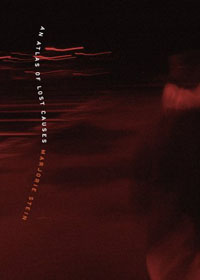 An Atlas of Lost Causes
An Atlas of Lost Causes
by Marjorie Stein
November 2011, Kelsey Street Press
112 pages / $16.00 Buy from Kelsey Street Press or SPD
As the title suggests, An Atlas of Lost Causes is a bound collection (and a documentary of sorts) that includes map-like textual matter, in the form of poetry and illustrations. On the surface, it reads as a story about the death of a twin told through narrative poems and letters but the story unfolds as the living twin struggles to uncover the mysterious circumstances surrounding her sister’s death. Conversely, beneath the surface this collection is a relative confession told in reverse by an unnamed narrator and made evident through the “cartoon-like drawing[s]” and the “mere thought experiment” (61). In beautifully written prose-style vignettes, Marjorie Stein allows us to journey with her characters as the memories shift between the past and present, all the while tethered to the narrator’s search for self, now that she is without her twin.
Using everyday details and scenarios, the darkness inside each poem serves to tell the story of what can happen when the desire to learn the cause of death is more important than mourning the one who died. Each poem seems to attempt exploration of a life’s memories as they begin to erase themselves. At its core, An Atlas of Lost Causes is the story of a twin searching for her own identity and reason to live by retracing the life of her dead sister.
The narrator presents a layered flow of rational and irrational thoughts dotted with interruptions of childhood memories, past experiences that she believes are hers, but could easily have been her sister’s, and vague meditations that sometimes morph into hauntingly alluring images that pull the reader from place to place and moment to moment in a reversed mapping of death. Fueled by a barrage of interrogation style questions, each of the seven “chapters” gets us (and the narrator) closer to “Day Zero.” The questions in the book grow in number as they do in life when we contemplate an unexplained death. “What are these words but shadow puppets dependent upon an opposite wall?” “What is the story?” “Have we any further to go?” “Did she mean to?” “Intent or accident?” “How could I know what happened?” “What has this to do with the problem at hand?” “Who wants to be the last one in line when the lights go out?”
Much of the narrative revolves around the life of the dead sister as examined by the remaining twin: “I intend to inventory my sister’s possessions.” (48) It is partially through statements masked in duality that we learn of the sisters. “She, my twin, used to think she was the heaviest object in the universe. Gravitational centerfold.” (61) We come to learn how the narrator feels about the dead twin and light is shed on why the living twin’s search for answers might be futile, thus a lost cause.
In the end, the narrator tells us she is “a liar next to this grief” and we are inclined to believe her. She has convinced us of this through her use of abstract language to analyze the police investigation into her sister’s death and through the way she combines poetic and concrete language to attribute death with tangible qualities of time and place. An Atlas of Lost Causes is a collection of the magnificent ramblings of a guilty conscience bound to regret and sorrow. Using the symbolic elements of twins and memory, the book loosely examines the word atlas, first as the atlas being that which supports the place where our memories reside, and second from the perspective of the Titan, Atlas, who was, like the narrator believes she is, punished for crimes against the gods who then forced him to live separated from his siblings in order to reduce their combined power. Eventually the narrator finds that the power of memory and siblings will not bring her answers because “everyone has an iridescent death of her own, lingering in winter hands.” (95)
***
Kiala Givehand is a poet, educator, and book artist whose writing has appeared in Jacket2,Calyx, and the Bella Vista Art Gallery in Chicago. She received her MFA in Poetry from Mills College and is the founding editor of Generations Literary Journal. She is a Cave Canem Fellow, a Voices of Our Nation (VONA) alum, and recipient of a 2011 Penland Winter Residency. A native Floridian, Kiala now resides in Oakland, CA with her husband Damon and their collections of books, yoga mats, and fine writing instruments.
Tags: An Atlas of Lost Causes, Kiala Givehand, Marjorie Stein
